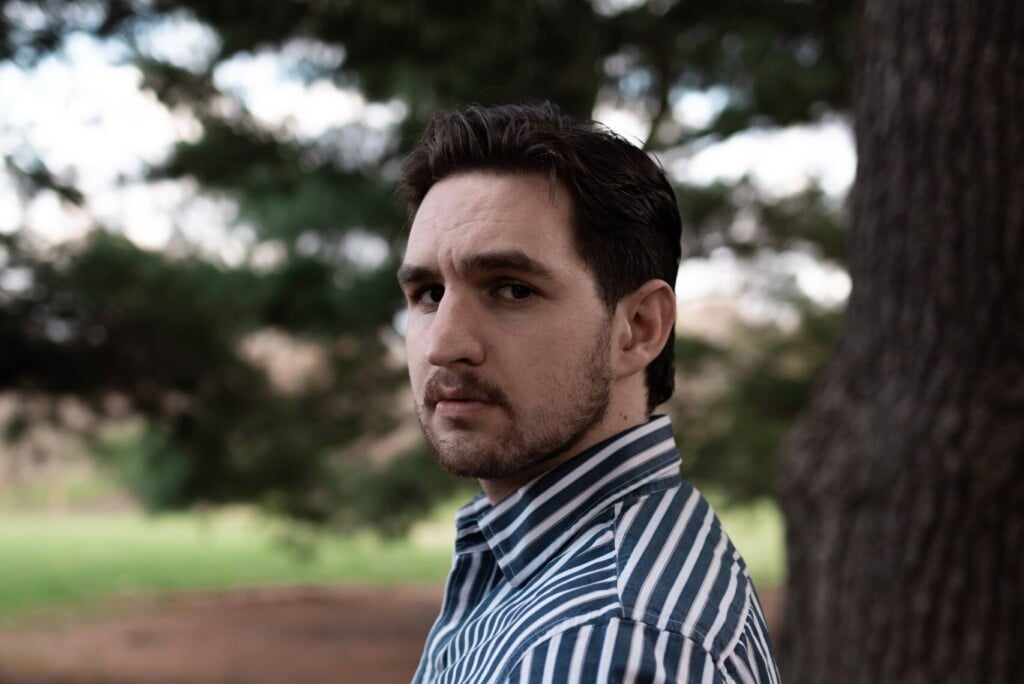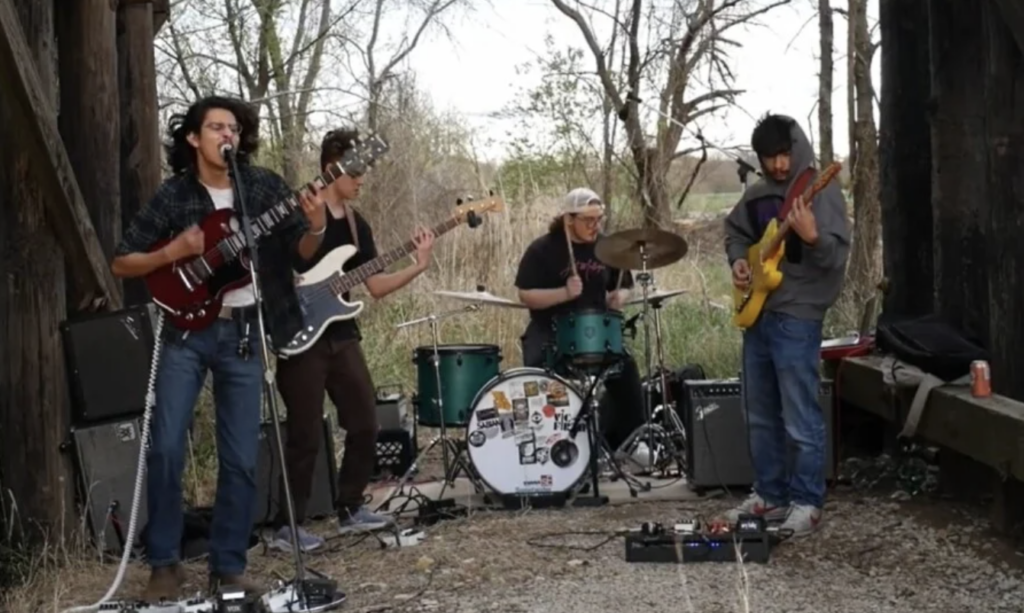Reverie Road’s Winifred Horan on bringing the band’s new music to life
Folk act Reverie Road‘s four members boast extensive and illustrious pedigrees from the world of Celtic music. Fiddler Winifred Horan and accordionist John Williams were both founding members of Solas, to say nothing of Horan’s time in beloved all-woman group Cherish the Ladies. Add in the fact fiddler Katie Grennan played with Gaelic Storm and Jazz and raga pianist Utsav Lal was a Young Steinway Artist, and any fan of Irish music would be champing at the bit to see them perform without having heard a second of music.
Of course, once you’ve heard Reverie Road, then you’d like to see them live. The only music the band currently has released is the single, “Gap of Dreams,” ahead of their self-titled debut which releases Friday, March 1, but it’s such an enchanting listen, but its five and a half minutes and the band’s pedigree ought to be enough to get you to the Kansas City Irish Center this Wednesday, February 7, to catch Reverie Road in concert.
We spoke by phone with fiddler Winifred Horan about the band’s history, how they came together, and that upcoming album ahead of the show.
The Pitch: How did Reverie Road come to be? You all have had very, very strong careers on your own.
Winifred Horan: Yes, we have. Actually, Reverie Road, I guess you could say was born out of the Covid pandemic. It was born out of coming out of the lockdown spending loads of time on the computers. Zooming, teaching online, performing online, playing online with friends. Katie Grennan, the other fiddle player in the band, her and myself were very active online together. We started a fiddle school–a fiddle workshop/long weekend scenario for one of the first winters during the Covid lockdown.
We called it “Fiddle Frenzy” and it was really successful. A lot of people signed on because obviously everyone was feeling the need to connect and yeah, play music. Katie and I were working a lot together during Covid and we’re friends anyway so, once Covid started to let up and we were coming out of the lockdown, I was on a sabbatical from the band Solas and Katie was leaving the band that she was in, Gaelic Storm, and we just said, “Why don’t we start something?”
Coming out of Covid, it’s the perfect time to start something new and fresh. I had been working with Utsav Lal, the pianist, for a couple of years as a duet project we had recorded together. John Williams was a former bandmate of mine from Solas, John and Katie are based in Chicago together and they’re married and it just seemed like a really great option to just put the two duets together and then Reverie Road was born just not even two years ago really.
Given you and John and Solas, you having been part of Cherish the Ladies, Katie having been part of Gaelic Storm, your resumes read like a who’s who of Celtic-influenced folk music.
Oh, well, thank you. Thank you. I appreciate that. Yeah. Everyone in their own right, both as ensemble members in the past, like myself and John, especially myself and John with Solas. We were both founding members of Solas and we recorded a couple of albums together. We toured together way back when and so that’s been a really amazing and beautiful reconnection, even though we never lost touch, but we’re playing together again a lot and it just feels really good.
It’s so beautiful the way life is very circular. We came back to each other in a way that we never expected. He’s married to Katie. Katie’s one of my really dear friends. John knew that Katie and I were working very closely together on fiddle school stuff and teaching and yeah, John’s resume, both from Solas and also as a solo artist, his work ethic is unbelievable.
He’s played with so many different ensembles, Tim O’Brien, the Crossing, Dean McGraw, he’s done soundtrack work. And Katie in her own right, as well Gaelic Storm Fiddler for five years–a really great Irish dancer. She has a couple of bands going now, the Bow Tides and Steam.
Then we come to Utsav Lal, the pianist, who I met as a student. He was a student of mine at the New England Conservatory in Boston. Honestly, the minute I heard him play, I was just blown away and both of us kind of knew that we wanted to continue to work together after he got out of school, so that’s what we did. Utsav comes from an Indian classical raga background. He was born in New Delhi, but he grew up and spent most of his formative years in Ireland. He was surrounded, immersed in Irish culture. That’s the connection there.
I always love talking to musicians who also work as teachers, because I feel like when you’re a teacher–or in any position, really, when you work with people who are younger than you and in their early 20s–you learn so much from them even as you’re teaching them. Is that–
Absolutely!
How does that help you as you go along making music?
First of all, great realization and observation. It’s really great to finally be on the other side of that. For many years, I was a student myself, right? I had many fine teachers, many schooling and education opportunities, the conservatory, all that and now, as I’ve been teaching more–and I was always teaching a little bit, but over the years, and especially since Covid my teaching really kind of kicked up a notch and so, in a way, Nick, I think I’d be selfish not to say that it was a lifeline for me, too, to be connecting with these young students, young musicians who are so passionate about playing and music, and that is infectious.
I think a lot of older musicians–or more seasoned musicians, I should say–sometimes can become very jaded about the business and about the process. It is labor intensive sometimes, but it’s always really, really refreshing to be in the company of younger, really passionate, no fear of taking risks [people]. They’re sponges and so it’s refreshing and it’s a lesson for me, as a teacher: “Oh, as teachers, we should learn from our students.”
I mean, it goes both ways and if it doesn’t, then I think it’s not a 100% healthy arrangement. I know that I learned something every time I have a lesson with one of my students. I learned something about myself–obviously about them, too, but sharing your craft and sharing your technique and your tricks of the trade an reminiscing about what I, as the seasoned older musician had to do as a youngster and as a teenager to get that technique under my belt and get disciplined, be disciplined–it’s a great experience and I wouldn’t trade it for the world. I absolutely love teaching.
The 11 songs that make up your debut album as Reverie Road–where did you draw these from? “Tres Elegante” is this beautiful piece that feels like classical music, in a way, but also very much of the Irish traditional music for which you all have been best known.
That’s one of my favorite tracks on the album. I have an affinity for that track, especially, because I really love French accordion music. Those two waltzes are French tunes, but I think they’re little folk tunes, really. They’re waltzes from the French tradition, but I think maybe the classical sort of essence behind like the bed of that track definitely has a classical leaning, I think, because of the accompaniment that Utsav provides to his chordal senses and John’s, as well.
John’s chordal senses on the accordion are just second-to-none and those two guys on that track specifically give the melody players so much color to work with. It even reflects the melody lines. That second waltz has a really arpeggiated, almost very classical sounding second part, but because the accordion and the piano are giving us such a colorful palette to work off of, that dictates the harmonic choices that the strings [make].
We did layer strings on some of those and it’s leaning towards a little bit of an almost chamber orchestra, string section vibes, but yeah, you’re really, really very observant. That is definitely sounding a little bit more on the classical side, but obviously just rough enough around the edges where I feel it’s still really earthy, you know?
Absolutely, and the jigs and reels that are on this album are very joyous, as well. With the band having trained Irish dancers as part of it, does that affect the approach you take to music, knowing you would move your feet to it?
Absolutely. I’m a good bit older than Katie, and Katie is still dancing, but every now and then, maybe at a party, I’ll get up and dance, but I can’t just rip it out of the bag these days. Got to warm up and stretch and all that, but no, that’s another great observation because as dancers, well–this question is so interesting because okay, when I’m playing my fiddle, I’m a musician at that point, but I have a dancer in me trying to get out.
Then, if I’m dancing, or if Katie’s dancing, and I know this cause we’ve talked about it, there’s a musician trying to get out. They really live with you forever, that sort of training and that sort of experience. I think having the experience of growing up as dancers and musicians, it’s invaluable. Some people comment on that energy that comes off of the jigs and the reels. Part of the reason why is that, we are not dancers first, but we’re dancers.
How would I want this? Does this inspire me to jump up out of my seat and start stepping it up? For certain tracks, that’s what you want. We want people to feel like, “This is making me want to move This is making me want to tap my feet.” It’s not intentional, but God, is it joyous!
You’re coming to town about a month before this album comes out. What is the the process for performing when you’re introducing people in Kansas City to the majority of these songs for the first time?
That’s another really beautiful and interesting process. The album technically drops on March 1, but we have the physical copies with us. Playing all of this new music off of this brand-new debut CD–and I remember thinking and feeling this way with Solas too–you get into the studio and it’s a totally different energy and experience recording and making tracks in the recording studio, especially with the advances in technology.
I don’t know any musician these days that doesn’t avail of some of those really beautiful technologies in the studio, like overdubbing and trying to create beautiful arrangements, not with technology, but with the help of technology. Reproducing them live on the stage, they completely turn into whatever they’re going to be just by virtue of the fact that you’re playing them live. You try to reproduce as best you can the energy that we captured in the studio, but obviously live performances–well, there’s nothing like that either.
You’re really in the moment because you have to be in the moment because literally, then it’s gone and it’s gone forever. You take advantage and you live in that moment as you’re playing live, whereas the recorded versions of these, we spend time. We had time to listen back to them, make sure things were good, make sure things were right, make sure we like this at a harmony here or there, all that stuff.
Reverie Road plays the Kansas City Irish Center on Wednesday, February 7. Details and tickets available here.





